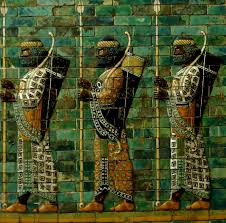A Message Concerning Elam
49: 34-39
A message concerning Elam DIG: Where would you find Elam today? Who was their biblical patriarch (Genesis 10:22)? What was Elam’s claim to fame? What was her destiny (Ezekiel 32:25-25)? Why do you think ADONAI promises to restore them, but not the people of Edom, Damascus, Kedar and Hazor? Is that fair? Did they have a choice?
REFLECT: What’s your “claim to fame?” How would life look if God took it away from you? What causes God’s discipline? If we ask for forgiveness (First John 1:8-10) does that mean we can avoid the consequences of our actions? Did these nations ever hear Jeremiah’s prophecies? For whose benefit were they intended? Do you learn from the hardships of others? What lesson did you pick up recently?
597 BC during the eleven-year reign of Zedekiah

In ancient times Elam was a significant nation in the politics of lower Mesopotamia. After many years of conflict in Assyria, Elam was finally conquered by Ashurbanipal about 640 BC, when the Assyrian King destroyed their capital of Susa. In 612 BC Cyaxares, the Median ruler, helped Nabopolassar of Babylon destroy Nineveh the Assyrian capital, and presumably this meant freedom for Elam once again. Though there is some evidence that Nebuchadnezzar defeated the Elamites about 596 BC, his subjugation at that time did not fulfill this prophecy. Elam became a central part of the Persian Empire that later conquered Babylon. No reason and no historical occasion is given for the harsh pronouncement of judgment against Elam. The language is thoroughly military.
This is the word of ADONAI that came to Yirmeyahu the prophet concerning Elam, early in the reign of Zedekiah king of Judah, shortly after Jehoiachin’s deportation (49:34). Elam was the first son of Shem (see the commentary on Genesis, to see link click Dj – The Line of Shem). The capital was in the ancient city of Susa (Esther 1:2 and 5; Nehemiah 1:1), located east of Babylon from which it was separated by the Tigris River.
Near historical prophecy of the destruction of Elam: This is what ADONAI-Tzva’ot says: See, I will break the bow (for which Elam was known in Isaiah 22:6) of Elam, the mainstay of their might (as in Hosea 1:5). YHVH, the God of tiny Judah, the real world Ruler, would set up His judgment throne in this mighty nation, hundreds of miles distant from Jerusalem; will remove its king and princes, appoint a ruler of His own selection, and scatter the nation around the world.258 I will bring against Elam the four winds from the quarters of the heavens and scatter them to the four winds (a vivid way of speaking of a judgment that is far-reaching as in Jeremiah 32-33; Ezekiel 37:9; Dani’el 8:8; Zechariah 2:6 and 6:5), and there will not be a nation where Elam’s exiles do not go (49:35-36). Elam would be utterly destroyed, never returning (shuwb) to her former status.
I will scatter Elam before their foes, before those who seek their lives; I will bring disaster upon them, even my fierce anger, declares the LORD (see Ae – The Problem of Holy War in the TaNaKh). I will pursue them with the sword until I have made an end of them (death). I will set My throne in Elam (subjugation or the setting up of another king’s throne as seen in 1:15 and 43:8-13) and destroy her king and officials, declares ADONAI (49:37-38).
Far eschatological prophecy of the restoration of Elam in the Messianic Kingdom: Yet I will restore (shuwb) the fortunes of Elam in days to come, declares the LORD (49:39). When Jeremiah (under the direction of the Holy Spirit) uses the phrase in the days to come; the days are coming; in those days; in that day, at that time; or for the time will surely come, the context points either to the near historical future or the far eschatological future and which one should be used. This is the fourteenth of twenty-five times that Yirmeyahu uses one of these phrases.
Some kingdoms will be restored during the Messianic Kingdom: Moab (48:47); Ammon (49:6); Elam and Assyria or Damascus (see the commentary on Isaiah Eg – Blessed Be Egypt, Assyria and Isra’el) and Egypt after forty years (46:26). However, other kingdoms will be totally destroyed, never to be inhabited again: Philistia (Di – A Message Concerning the Philistines); Edom (see the commentary on Isaiah Gi – Edom’s Streams Will Be Turned into Pitch); Kedar and Hazor or Saudi Arabia (49:33) and Babylon (see the commentary on Revelation Er – Babylon Will Never Be Found Again). As a result of God’s sovereign rule, Elam is one of those fortunate countries.



Leave A Comment